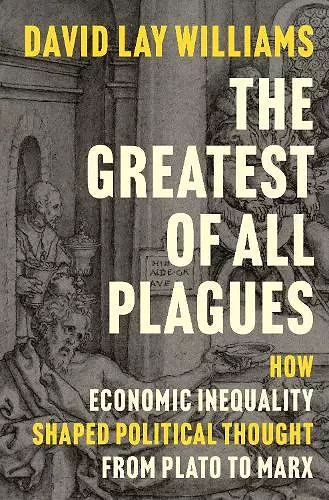The Greatest of All Plagues
How Economic Inequality Shaped Political Thought from Plato to Marx
Format:Hardback
Publisher:Princeton University Press
Published:29th Oct '24
Should be back in stock very soon

How the great political thinkers have persistently warned against the dangers of economic inequality
Economic inequality is one of the most daunting challenges of our time, with public debate often turning to questions of whether it is an inevitable outcome of economic systems and what, if anything, can be done about it. But why, exactly, should inequality worry us? The Greatest of All Plagues demonstrates that this underlying question has been a central preoccupation of some of the most eminent political thinkers of the Western intellectual tradition.
David Lay Williams shares bold new perspectives on the writings and ideas of Plato, Jesus, Thomas Hobbes, Jean-Jacques Rousseau, Adam Smith, John Stuart Mill, and Karl Marx. He shows how they describe economic inequality as a source of political instability and a corrupter of character and soul, and how they view unchecked inequality as a threat to their most cherished values, such as justice, faith, civic harmony, peace, democracy, and freedom. Williams draws invaluable insights into the societal problems generated by what Plato called “the greatest of all plagues,” and examines the solutions employed through the centuries.
An eye-opening work of intellectual history, The Greatest of All Plagues recovers a forgotten past for some of the most timeless books in the Western canon, revealing how economic inequality has been a paramount problem throughout the history of political thought.
"Impressive…[Williams] shows that such wildly different figures all saw economic inequality as a grave political threat….He makes a persuasive case that these thinkers were right to be so troubled, and that we still have much to learn from their arguments and proposals….a welcome reminder that exploring the history of philosophy can also be an inquiry into the present world."---Nick Romeo, Washington Post
"Excellent."---Samuel Moyn, The Nation
"A Magnum Opus."---Lilly Goren, New Books Network
"I just loved the sweep of this book. It is a really comprehensive analysis of inequality in the thought of major figures in the history of political thought. . . . It’s a great contribution."---Jeffrey Church, Political Theory Review podcast
"Interesting and useful." * Choice *
"Williams wants to show that economic inequality isn’t some peculiar fixation of the 21st century that can be easily dismissed by those who fancy themselves defenders of the Western canon. And in that, he succeeds magnificently."---Ben Burgis, Compact Magazine
"Williams’ thinkers confront us with powerful arguments against inequality: it degrades civilisation because it rewards greed at the expense of the community, ultimately destroying any basis for social cooperation and respect for the rule of law."---Justin H. Vassallo, UnHerd
"The Greatest of All Plagues often makes for bracing reading. It succeeds in taking figures who many of us might think we are familiar with, and shows us that we didn’t know them that well at all. Williams shows that economic inequality is not only the greatest of all plagues — it is also one of the longest lasting, such that many of the most influential thinkers of several epochs felt called upon to condemn it."---Matt McManus, Jacobin
"This well written retrieval of the tradition of the history of political thought offers a rich treatment of why and how economic inequality contributes to social disunity, political instability, and deep-seated personal and collective moral corruption." * Saint Raphaël Church *
"Williams' insights, grounded in the wisdom of historical thinkers, offer a compelling argument for why economic inequality poses a danger to society. He demonstrates that the problem extends beyond mere economic disparities, impacting social cohesion, political stability, and individual well-being."---Jonathan Singer, Social Work podcast
"[T]he concerns that Williams raises via his chosen figures are significant, pressing, and far too often overlooked within contemporary debates that fail to take advantage of the riches offered by the history of political thought. This book is a major contribution and deserves a wide readership."---Dennis C. Rasmussen, Perspectives
"[A] thoughtful reconsideration of past thinkers’ views of economic inequality."---Andrew Robinson, Nature
"Superb."---Anne Phillips, Cambridge Review of International Affairs
"Most will already know that Jesus, Jean Jacques Rousseau, and Karl Marx decried greed. Yet few are aware that Plato, Thomas Hobbes, Adam Smith, and John Stuart Mill also argued against the pernicious political and moral ills that excessive economic inequality brings. I learned a lot from Williams’ corrections and suspect you will also."---Jag Bhalla, Sublation Magazine
"An absolute intellectual feast."---Steven Durlauf, The Inequality Podcast
"Each chapter stands on its own and could be read with profit by anyone interested in these thinkers."---Eric Brandom, Liberal Currents
"As David Lay Williams brilliantly outlines in The Greatest of All Plagues, the conservative canon is riddled with thinkers that have registered objections to inequality. . . . Free market evangelists have treated economic egalitarianism as an invention of the political left. But Williams’s book suggests that this is simply wrong."---Jack Jeffrey, Fairness Foundation
"Splendid."---Branko Milanovic, Global Inequality and More 3.0 substack
"Excellent and timely."---Maria Bach, Economic Record
"An immensely learned book."---Samuel Piccolo, Review of Politics
ISBN: 9780691171975
Dimensions: unknown
Weight: unknown
424 pages